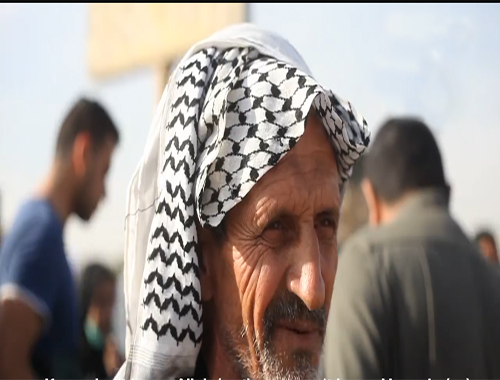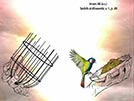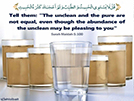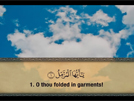After-the-Salat Invocation
- Details
- Hits: 4186
After-the-Salat Invocation
--------------------------------------------------------------------------------
It is one of the confirmed mustahabs (supererogatories), and to neglect it is abominable. It is most recommended after the salats of the morning and of the afternoon. The after-the-salat invocations are so many, including the final three takbirs.
The great religious men take care to raise their hands in the takbirs, like the opening takbirs, to near their ears, with their palms open and facing the qiblah. To prove this is difficult, although some narratives refer to raising the hands three times. Probably raising the hands, saying the takbir three times and then reciting the du`a' which starts with :la ilaha illallah, wahdahu wahdah ... [616] (there is no god but Allah, alone, alone!) etc., will be enough. If raising the hands in the way the great men do is a supererogatory act, it confirms the same secrets which have already been stated, and maybe it refers to rejecting their salat and worshippings lest they may admit conceit and self-admiration into their hearts.
The three takbirs may be a reference to magnification (s) (takbir(s)) showing the shortcomings of the Three Unities which keep the spirit of the whole salat. So, the hearty discipline of these takbirs is to reject, with each raising of the hands, one of the three unities, and magnify and glorify Allah, Almighty and Most High, from his describings and unifications, displaying his inability, humility, failure and shortcomings before the Holy Presence of Allah, Almighty and Most High. In the Sirrus-Salat thesis we related, in a nice [latif] way, the spiritual secrets of these takbirs and raising the hands. It was of the graces of Allah, the Exalted, bestowed upon this helpless person. For Him are the thanks and praise.
Of the other noble after-the-salat du`a's are the tasbihat of the Pure Siddiqah (Fatimah) (AS), the daughter of the Prophet (SA), which was taught to her by the Messenger of Allah (SA). It is the best of the after-the-salat duas. It is in the hadith that had there been a better one , the Messenger of Allah (SA) would have taught it to Fatimah (AS) [617]. Imam as-Sadiq (AS) is quoted to have said that these tasbihs every day after every salat are more loved by me than a thousand rak`ats of the salat every day. [618] It is known among the companions that these tasbihs are arranged as follows: takbir thirty-four times, tahmid thirty-three times and tasbih thirty-three times. It is most probable that this arrangement is the best, not positively imposed. One is free to change the successions of, say, the tahmid and the tasbih, or replace the takbir by the tasbih. But the best, and according to precaution, is the said known arrangement.
The relevant cordial disciplines are the same as have been stated concerning "the Four Tasbihs". Furthermore, as these noble recitations are for after the salat, and as their tasbih is magnification [takbir] and glorification [tanzih] showing failure in due servitude, and magnification [takbir] and glorification [tanzih] showing incapability in servitude before His Holy Presence, and magnification [takbir] and glorification [tanzih] showing the shortcomings of knowledge [ma'rifat] (in knowing Him), which is the objective of servitude, the salik servant should, in the after-the-salat invocation, think about his shortcomings, his incomplete worship and his negligences during the state of presence, which are regarded to be sins in the school of love and affection. He is to think about his being deprived of his share of the Holy Presence of Allah, the Exalted, so that he may, in the after-the-salat recitations, which open a new door leading to the mercy of Allah, the Blessed and Exalted, compensate as much as possible, conveying those noble recitations to his heart and revive it with them, in which case his end may be sealed with goodness and happiness. In the tahmid (praising) of the tasbihs of the (pure) Siddiqah (AS), he is to prove this praising, too, which is the performance of servitude, for the Divine Ipseity (huwiyat-i ilahiyah], taking it to be a support, a power and a success from that Holy Essence. He is to convey the truths of these matters to the inside of his heart, letting it taste the secret of these graces, so that the heart may be enlivened with the rememberance of Allah, and get eternal life by it.
As the morning is the beginning of being engaged in the multiplicity and entering the world, where man is faced with the danger of getting busy with the creatures and neglecting Allah, the conscious salik, in this crucial situation of entering this dark house, has to turn to Allah, the Exalted, and be devoted to Him. And as he finds himself not so dignified in the Holy Presence, he is to resort to the guardians of the affairs, the guards of the times, the intercessors of ins and jinn, i.e., the Seal of the Messengers (SA) and the infallible Imams (AS), asking those honourable personalities to be his intermediates to, and his intercessors with, Allah. Now each day has its guard and shelterer: for Saturday it is the blessed being of the Messenger of Allah (SA), for Sunday it is Amirul Mu'mimn, 'Ali (AS), for Monday are the two magnificent Imams, the grandsons [of the Messenger of Allah (SA), al-Hasan and al-Husayn (AS)], for Tuesday Imams as-Sajjad, al-Baqir and as-Sadiq (AS), for Wednesday Imams al-Kazim, ar-Rida, at-Taqi and an-Naqi (AS), for Thursday Imam al-`Askari (AS), and for Friday waliyul amr (may Allah hasten his happy advent) (The 12th Imam (AS) [619]. So, it is suitable for one, in the after-the-salat recitations in the morning, and for the purpose of entering this deadly dark sea, the awful Satanic trap-place, to resort to the guards of that day, and, with their intercession-as they are close to the Holy Court and are the favourate confidents at the door of intimacy-ask Allah, the Exalted, to remove the evils of Satan and the evil-commanding soul, and to have those great ones as his intermediates for the completion and acceptance of incomplete worshippings and unworthy rites. Naturally, if Allah, Highly Exalted, made Muhammad (SA) and his offspring our means of guidance, and through their blessings He saved the ummah from ignorance and straying, He would, because of their intercession, amend our inability and complete our shortcomings, and accept our unworthy obediences and worshippings, "He is the Lord of grace and bounty." Other reported after-the-salat du`a's are stated in the relevant books of invocations. Everybody may select those which suit him best in order to bring this honourable journey to its good and happy destination.
Notes:
[616]. Wasa'ilush-Shi`ah, vol. 4, p. 1030, "The Book of the Salat" chs. on "After-the-Salat Invocation" ch. 14, hadith 2.
[617.] Furu `ul Kafi, vol. 3, p. 343, "The Book of the Salat" ch. on "The After-the-Salat Du'a"', hadith 14.
[618]. Biharul Anwar, vol. 83, p. 332, quoting Thawabul A'mal, p. 149. Wasa'ilush-Shi'ah, vol. 4. p. 1024, " The Book of as-Salat ", chs. on "After the-Salat Invocation", ch. 9, hadith 2.
[619]. Biharul Anwar, vol. 24, p. 239, quoting al-khisal, vol. 2, p. 394, ch.7.











